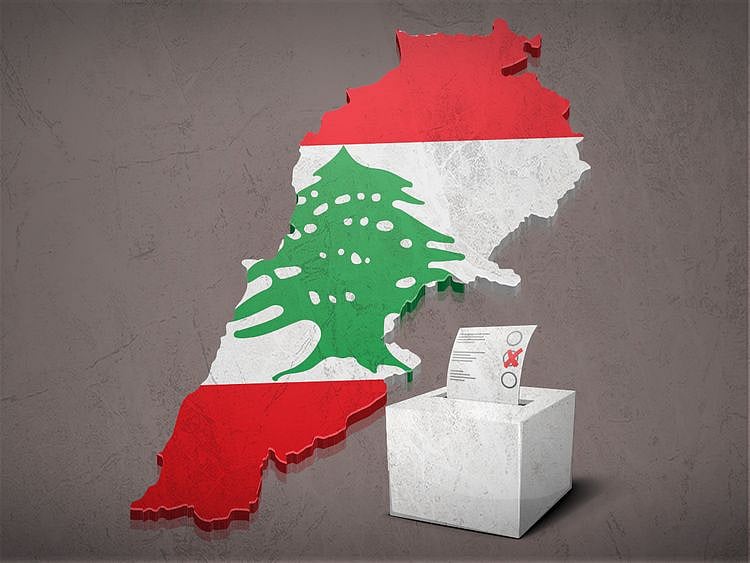By end of this month, Lebanon will have a new parliament. Elections are planned for May 15, 2022, yet they probably will result in no real change within the Chamber of Deputies. Once the new chamber is inaugurated, Prime Minister Najib Mikati’s government will automatically resign, in accordance with Article 69 of the Lebanese Constitution.
A new government has to be formed before President Michel Aoun’s term ends in October, which might be easier said than done, due to bickering of the Lebanese political class. It can take weeks and months, possibly a year, for any premier to form a government, and if one is not ready by October, then no presidential election will happen. But more dangerously, if there is no cabinet, then Lebanon won’t be able to fulfil any of the reforms required by the International Monetary Fund (IMF), outlined last April as a precondition to obtain a $3 billion loan.
Among other things, the IMF is asking Lebanon to float its exchange rate, monitor government spending, revamp the electricity sector, combat corruption in the public sector, and introduce one law for capital control and another for banking secrecy. Lebanon would also be required to reschedule its debt to international creditors, after famously defaulting in March 2020.
The financial crisis
And even then, the loan still needs to be signed off by the IMF Board. At first glance, these conditions may seem far easier than the ones set forth by international donors in France back in April 2018, which included clipping the wings of Hezbollah and empowering the Lebanese Army in exchange for $11 billion. A closer look, however, shows that they are not.
When it comes down to details, however, how can Lebanon liberate its currency without triggering a major hike in prices? Food and fuel expenses are already on the rise, due to the Ukraine War. Ninety-six per cent of the country’s wheat comes from Ukraine, and with no end in sight on that front, the crisis can drag well into the autumn or early winter, jeopardising the food basket of ordinary Lebanese, who are already hovering on the edge of poverty. Their razor-thin savings have already dried up, and their money remains locked up at banks, completely inaccessible since late 2019.
Rebuilding the country
Additionally, Lebanon has raised none of the money required to rebuild Beirut, nearly two years after the infamous port explosion that killed over 200 civilians and tore down half the city. According to the World Bank, that alone will cost anywhere between $3.8-4.6 billion.
The Lebanese government simply cannot raise taxes on an impoverished population, nor can it rely on donations from Saudi Arabia, so long as Hezbollah remains in control of the country. It also cannot expect revenue from tourism, once considered the pride and joy of a country formerly known as “Switzerland of the Middle East.”
President Michel Aoun would love to see the loan materialise, however, in order to end his presidency with a rare positive achievement. A success story would do him well, and serve the interests of his son-in-law Gibran Bassil, who hopes to succeed him next October.
Najib Mikati would also welcome the loan, using it to market himself for a fourth round at the premiership. In accordance with the IMF conditions, the Mikati government has already approved a capital control draft law, setting terms for bank withdrawals: up to $1,000 or its equivalent in Lebanese pounds. The law still doesn’t say when and how depositor money will be restored to its rightful owners, however, and it still needs approval of the outgoing parliament, before its mandate ends on May 21.
But even then, there are plenty of “what ifs” that apply to Lebanon. What if any of the major political parties, like Aoun’s Free Patriotic Movement (FPM) refuse to recognise results of the May 15 elections? The FPM is poised for a major defeat at the polls, blamed for all the economic woes associated with the Aoun era.
If their present bloc of 29 MPs is slashed in half — which is very likely — then they might take to the streets or at best, take the matter to court. What if Hezbollah and the Lebanese Forces (LF) clash during the elections, like they did last October? Back then, six people were killed, and more might die if there is a security breakdown.
And even if none of that happens, how will Najib Mikati — or anybody else — manage to form a government that accommodates all the rival parties? Saad Al Hariri and his Future Movement have boycotted elections, meaning that with no parliamentary bloc, they won’t receive a share of government seats. Who will represent Sunnis in their absence? And whoever does, will Hariri accept him/them?
He is already at daggers-end with all those trying to replace him at the helm of Sunni politics, whether its Sunnis affiliated with Hezbollah or former members of his Future Movement, now rallied around his former friend and ex-prime minister Fouad Siniora.
And if the FPM ends up with a tiny parliamentary bloc, will it be entitled to join a new government? If it is left out, will Gibran Bassil take defeat lightly? Or will he fight to remain relevant, ahead of the presidential elections?
The answers to all these questions are rooted in politics, without real consideration of the economic challenges facing the country. A better question would be: how would Lebanon — as a state — continue to survive if its coffers remain empty?
Sami Moubayed is a Syrian historian and former Carnegie scholar. He is also author of Under the Black Flag: At the frontier of the New Jihad.
Sign up for the Daily Briefing
Get the latest news and updates straight to your inbox
Network Links
GN StoreDownload our app
© Al Nisr Publishing LLC 2026. All rights reserved.
